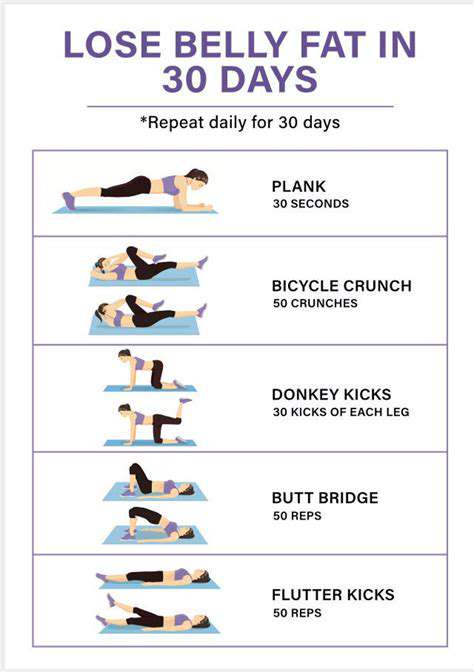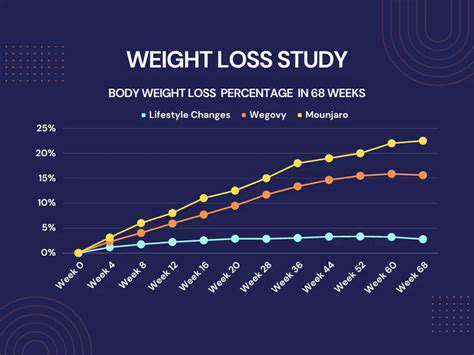10 Best Exercises to Lose Belly Fat Fast
Beyond the Gym: Everyday Activities for Belly Fat Reduction

Integrating Movement into Daily Life
Incorporating physical activity into routine tasks creates substantial cumulative benefits. Simple choices like stair-climbing instead of elevator use or parking farther from destinations make meaningful long-term differences. These minor adjustments seamlessly integrate fitness into daily living rather than treating it as a separate obligation.
Beyond obvious cardiovascular and weight management benefits, daily movement enhances mood and reduces stress. Physical exertion combined with mental breaks from work tasks promotes mental clarity and emotional balance.
Exploring Active Commuting Options
Consider replacing motorized transport with walking or cycling for routine trips. This economical alternative provides excellent incidental exercise while reducing environmental impact. Even brief lunchtime walks significantly boost afternoon energy and concentration levels.
Active commuting offers enjoyable opportunities to appreciate local surroundings while improving fitness. The fresh air and changing scenery enhance the commuting experience beyond simple transportation.
Incorporating Movement into Work and Home
For desk-bound workers, implementing regular movement breaks is essential. Setting reminders to stand and stretch hourly alleviates stiffness and improves circulation, enhancing productivity.
Domestic chores present excellent activity opportunities. Approaching cleaning or gardening with purposeful, energetic movements transforms routine tasks into effective mini-workouts. Simple modifications like pacing while talking on the phone or doing calf raises during television commercials add meaningful activity.
Maximizing Opportunities for Play
Incorporating enjoyable physical activities makes exercise feel like recreation rather than obligation. Participating in sports, dance, or active play with children provides both fitness benefits and emotional satisfaction. When physical activity becomes pleasurable, long-term adherence increases substantially.
Whether playing recreational games or enjoying nature walks, these activities improve cardiovascular health while reducing stress. Finding personally engaging physical pursuits ensures sustainable fitness habits.
Nutrition and Lifestyle for Maximum Results

Balanced Dietary Approaches
Optimal nutrition requires consuming diverse foods from all major groups, ensuring adequate intake of essential nutrients. A varied, balanced diet supports bodily functions and sustains energy levels throughout the day.
Focusing on whole, minimally processed foods provides maximum nutritional value. These nutrient-dense options promote digestive health and lasting satiety. Simultaneously limiting processed items, sugary drinks, and unhealthy fats supports weight management and reduces disease risk.
Hydration and its Significance
Proper fluid intake is fundamental for physiological processes including nutrient transport, temperature regulation, and joint lubrication. Adequate hydration significantly impacts both physical and cognitive performance.
Consistent water consumption throughout waking hours maintains optimal hydration. Dehydration causes fatigue, headaches, and impaired mental function. Water-rich foods like fruits and vegetables supplement daily fluid requirements.
Importance of Regular Exercise
Consistent physical activity maintains healthy weight, builds strength, improves cardiovascular function, and enhances mood. Regular exercise substantially strengthens immune system function.
Physical activity directly benefits mental health through endorphin release. These natural compounds alleviate stress and improve emotional well-being. Choosing enjoyable activities like dance or team sports ensures long-term exercise adherence.
Regular exercisers typically experience improved sleep quality, which is essential for overall health. Quality rest supports cognitive function and daily energy levels.
Stress Management Techniques
Effective stress reduction is crucial for comprehensive wellness. Chronic stress negatively impacts both physical and mental health, affecting systems from digestion to cardiovascular function.
Implementing relaxation practices like meditation or controlled breathing significantly lowers stress. Prioritizing sufficient sleep and maintaining consistent sleep patterns also helps manage stress. Engaging in enjoyable hobbies and nature activities provides additional stress relief.
Sleep Hygiene and its Impact
Adequate, quality sleep is essential for physical recovery and cognitive function. Sleep regulates hormones, improves mood, and strengthens immune response.
Establishing consistent sleep schedules and relaxing pre-bed routines enhances sleep quality. Creating an optimal sleep environment - cool, dark, and quiet - promotes restful sleep. Limiting screen time and avoiding late meals or caffeine further improves sleep patterns.
Read more about 10 Best Exercises to Lose Belly Fat Fast
Hot Recommendations
-
*Guide to Managing Gout Through Diet
-
*Best Habits for Financial Well being
-
*How to Build a Routine for Better Mental Health
-
*How to Eat Healthy on a Budget [Tips & Meal Ideas]
-
*Guide to Practicing Self Acceptance
-
*How to Incorporate More Movement Into Your Day
-
*Guide to Managing Chronic Pain Naturally
-
*Guide to Building a Reading Habit for Well being
-
*Top 5 Weight Loss Supplements That Actually Work
-
*Best Exercises for Postpartum Recovery [Beyond Abdominal Work]
![Best Books on Mental Health and Well being [Recommended Reads]](/static/images/26/2025-05/CultivatingSelf-CompassionandPositiveSelf-Talk.jpg)










